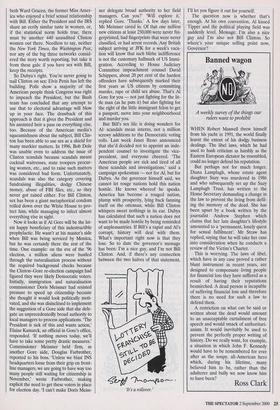Banned wagon
A weekly survey of the things our rulers want to prohibit
WHEN Robert Maxwell threw himself from his yacht in 1991, the world finally learnt the extent of his dodgy, business dealings. The libel laws, which he had used to hush criticism as harshly as the Eastern European dictator he resembled, could no longer defend his reputation.
But perhaps not for much longer. Diana Lamplugh, whose estate agent daughter Suzy was murdered in 1986 and who subsequently set up the Suzy Lamplugh Trust, has written to the Home Secretary demanding a change in the law to prevent the living from defil- ing the memory of the dead. She has been upset by a book written by the journalist Andrew Stephen which claims that her late daughter's lifestyle amounted to a 'permanent, lonely quest for sexual fulfilment'. Mr Straw has replied, saying that he will take her case into consideration when he conducts a review of the Victim's Charter.
This is worrying. The laws of libel, which have in any case proved a rather blunt instrument in recent years, are designed to compensate living people for financial loss they have suffered as a result of having their reputations besmirched. A dead person is incapable of suffering financial loss and therefore there is no need for such a law to defend them.
A restriction on what can be said or written about the dead would amount to an unacceptable curtailment of free speech and would smack of authoritari- anism. It would inevitably be used to prevent the perfectly proper writing of history. Do we really want, for example, a situation in which John F. Kennedy would have to be remembered for ever after as the soupy, all-American hero which, during his lifetime, many believed him to be, rather than the adulterer and bully we now know him


























































 Previous page
Previous page